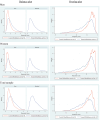From Breath to Strength: Does Mindfulness Improve Handgrip Strength Among Older Adults in India? A Propensity Score Matching Analysis
- PMID: 40545251
- PMCID: PMC12182966
- DOI: 10.1111/psyg.70057
From Breath to Strength: Does Mindfulness Improve Handgrip Strength Among Older Adults in India? A Propensity Score Matching Analysis
Abstract
Background: The integration of mindfulness activities into the daily lives of older adults has demonstrated profound benefits for their overall well-being and vitality. However, evidence on how mindfulness correlates with muscle strength in older adults remains limited. To fill this gap, we explored the association between mindfulness activities and handgrip strength (HGS) in older adults in India. We also examined whether this association varies by sex.
Methods: We employed a propensity score matching technique, leveraging data from the nationally representative Longitudinal Aging Study in India (2017-2018), comprising 27 071 adults aged 60 and above. HGS was measured using a handheld Smedley Hand Dynamometer while participants self-reported their engagement in mindfulness activities.
Results: Seventeen % of the men and 11.5% of the women engaged in mindfulness activities. Analysis of the matched sample revealed that the average treatment effect (ATE) that represents the average effect across the entire population was 1.28 kg for men and 0.60 kg for women, indicating that, on average, participation in mindfulness activities was associated with modest improvements in HGS for both sexes. Further, in the PSM matched regression models, for men, engagement in mindfulness activities was consistently associated with higher HGS across all models including the average treatment effect on the treated (ATT), on the untreated (ATU), and ATE, with the largest effect seen in the ATE model (β = 1.08, 95% CI: 0.77-1.40). For women, the association was weaker and significant only in the unmatched and ATE models.
Conclusions: Engagement in mindfulness activities was associated with modest but meaningful improvements in HGS among older adults in India, with the associations being much more pronounced in older Indian men. These findings underscore the significance of integrating mindfulness practices into public health initiatives aimed at promoting healthier aging.
Keywords: India; aging; handgrip strength; mindfulness activities.
© 2025 The Author(s). Psychogeriatrics published by John Wiley & Sons Australia, Ltd on behalf of Japanese Psychogeriatric Society.
Conflict of interest statement
The authors declare no conflicts of interest.
Figures
Similar articles
-
Does caring for grandchildren influence life satisfaction? A national-level analysis among older adults in India using a propensity score matching approach.BMC Public Health. 2025 Jul 4;25(1):2386. doi: 10.1186/s12889-025-23524-3. BMC Public Health. 2025. PMID: 40616010 Free PMC article.
-
Systemic pharmacological treatments for chronic plaque psoriasis: a network meta-analysis.Cochrane Database Syst Rev. 2021 Apr 19;4(4):CD011535. doi: 10.1002/14651858.CD011535.pub4. Cochrane Database Syst Rev. 2021. Update in: Cochrane Database Syst Rev. 2022 May 23;5:CD011535. doi: 10.1002/14651858.CD011535.pub5. PMID: 33871055 Free PMC article. Updated.
-
Home treatment for mental health problems: a systematic review.Health Technol Assess. 2001;5(15):1-139. doi: 10.3310/hta5150. Health Technol Assess. 2001. PMID: 11532236
-
The effectiveness and cost-effectiveness of carmustine implants and temozolomide for the treatment of newly diagnosed high-grade glioma: a systematic review and economic evaluation.Health Technol Assess. 2007 Nov;11(45):iii-iv, ix-221. doi: 10.3310/hta11450. Health Technol Assess. 2007. PMID: 17999840
-
Systemic pharmacological treatments for chronic plaque psoriasis: a network meta-analysis.Cochrane Database Syst Rev. 2017 Dec 22;12(12):CD011535. doi: 10.1002/14651858.CD011535.pub2. Cochrane Database Syst Rev. 2017. Update in: Cochrane Database Syst Rev. 2020 Jan 9;1:CD011535. doi: 10.1002/14651858.CD011535.pub3. PMID: 29271481 Free PMC article. Updated.
References
-
- Moss A. S., Reibel D. K., Greeson J. M., et al., “An Adapted Mindfulness‐Based Stress Reduction Program for Elders in a Continuing Care Retirement Community: Quantitative and Qualitative Results From a Pilot Randomized Controlled Trial,” Journal of Applied Gerontology 34 (2015): 518–538, 10.1177/0733464814559411. - DOI - PMC - PubMed
-
- Kennedy A. B. and Resnick P. B., “Mindfulness and Physical Activity,” American Journal of Lifestyle Medicine 9 (2015): 221–223, 10.1177/1559827614564546. - DOI
-
- Young L. and Baime M. J., “Mindfulness‐Based Stress Reduction: Effect on Emotional Distress in Older Adults,” Complementary Health Practice Review 15 (2010): 59–64, 10.1177/1533210110387687. - DOI
MeSH terms
LinkOut - more resources
Full Text Sources
Medical
Research Materials
Miscellaneous



